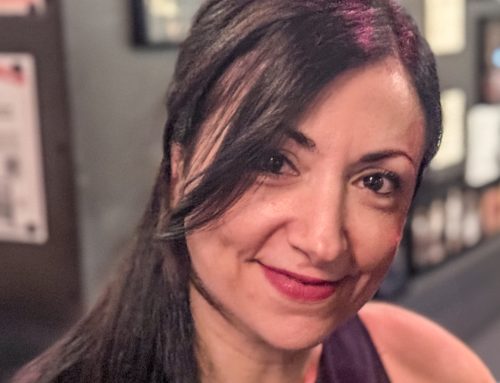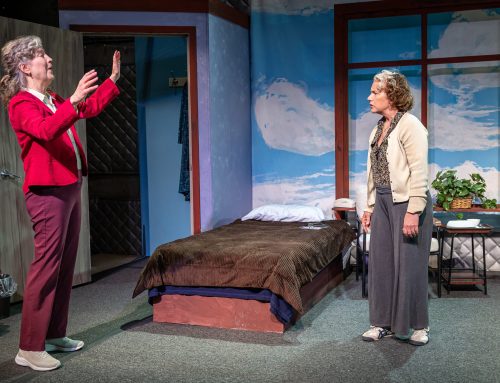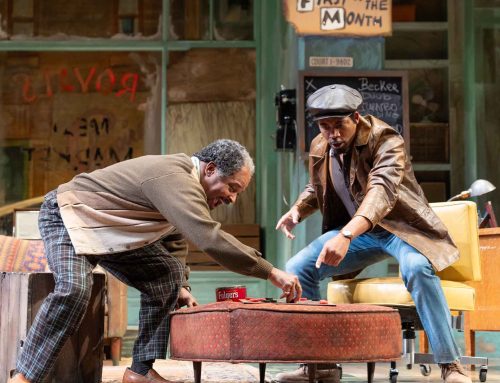UP by Bridget Carpenter
After Larry Walters had his 15 minutes of fame flying a balloon-lifted lawn chair from his LA-area home in 1982, he dropped from the cultural radar. After the talk shows and the one-trick motivational speeches were over, the man still had a life to live. But, he lived back down on the ground and he didn’t surface again in the public stratosphere. So, what happened?
Bridget Carpenter’s UP is set 15 years after Larry’s – or “Walter Griffin” in the play – headline-grabbing ride. We join the the daily life of his family which includes a fifteen-year-old son born right after the lawn chair flight and Walter’s wife, Helen. Walter is still searching for his next opportunity for invention and fame. Helen provides the for the family by delivering mail. Son Mikey is a negative teenager whose angst hooks him up with Maria, a quirky fellow-sophomore, and Maria’s brassy Aunt Chris.
The cast is perfectly sized to allow the Walter’s dreaming impracticalness to deepen into psychosis while Mikey/Michael does the coming of age thing. Mikey is the cross over between the two families, and the point/counterpoint of their outlooks works extremely well. The Griffins struggle financially as Walter’s dreams overpower Helen’s ability to make money and keep grounded in the present. Maria and Aunt Chris are out-there, brassy, romantic-free, practical, successful White Trash.
Love, cynicism, and desperation abound within the families and are transmitted through Mikey. The inevitable toxic result sneaks up on the audience in this well-woven drama.
The staging is spectacular with the focus of visual attention so vivid that you repeatedly don’t see the unused furniture or backdrop that belongs to the other family or other time. Carpenter places Phillippe Petit (and here) in Walter’s reveries as the hero who creates an authentic, attention-grabbing, financially viable life. Petit does his high-wire act above the set as scenes change or when Walter needs more hope. He’s a neat visual and symbolic apparition, and U. Jonathan Toppo is flawless in his muscular miming.
Another bit of laudable stagecraft has both families on stage, simultaneously talking within their own living rooms, blending and contrasting the ways the Griffins think and act with the outlook of Maria and Aunt Chris. It works extremely well.
The revelations, dramas, disappointments, and learnings are amazing for a full hour and 50 minutes. The play runs 2 hours, 10 minutes.
Carpenter put so many balls into the air, the juggling was complex and wonderful to behold. But, she also wrote herself into a corner. You could feel the need for play to end, and yet you couldn’t figure out what resolution would be satisfying. It’s the great tension whose release makes a great night of theater. Or not.
UP doesn’t have an ending that ties up the plots, recaps the changes, or leaves us with clarity much less uplifting hope. Worse, it just doesn’t end, it creates a final, unnecessary Devil ex machina and then goes back in time to start the story over. Huh?
Instead of a deserved standing ovation at the end of a two-hour production with a snappy ending, the audience applauds enthusiastically but leaves mumbling about the fire and the final flight. Such is modern theater when play writers move on instead of coming back to fix their flaws.
UP‘s cast is terrific. Richard Howard’s Walter Griffin is controlled, dreaming, and disparately believable. Terri McMahon is a perfect match as his wife, and John Tufts shows the depth and range perfect in this role (and which the bad writing of Anne Frank kept him from displaying). Ashland virgin Christine Albright is a vivid knocked-up Maria. She tosses off lines and attitude naturally when, in fact, they aren’t too normal sounding on paper. My only compliant is about Robin Goodrin Nordli whom everyone else loved. As Aunt Chris and in cameos as Helen’s mother, she’s written as a comic relief, I guess. But, I never like broad acting, and although I found her cardboard demeanor funny, I was also annoyed.
This is UP‘s second staging, the first being in Alaska in 2003. It’s a good show. It uses a modern topic to illuminate classic topics. It just needs a new ending.
Ozdachs rating **** out of *****.






The town gossip is that UP‘s ending is still a work under construction. The version I saw and hated is different than the ending which finished the play’s original run in Anchorage. Apparently there’s wide-spread agreement that there’s a need for a third try at an ending.